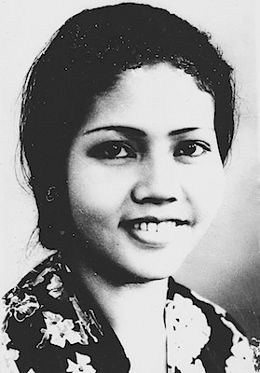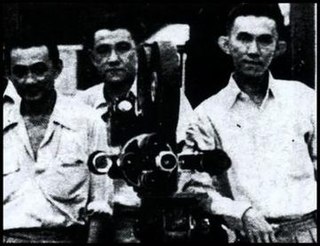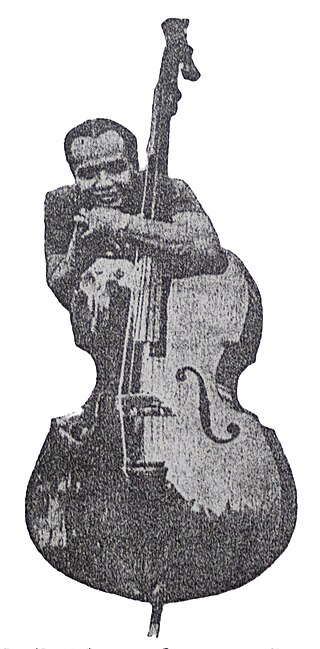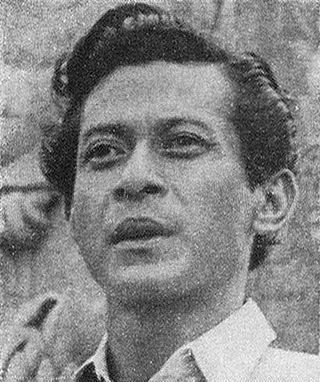
Tan's Film was a film production house in the Dutch East Indies. Established by the brothers Tan Khoen Yauw and Tan Khoen Hian on September 1, 1929, its films were mostly targeted at native ethnic groups. Starting with Njai Dasima in 1929, the company released fifteen movies before ultimately being dissolved after the Japanese occupation. The Tans and the Wong brothers established Tan & Wong Bros in 1948 to continue this work.

Pareh, released internationally as Pareh, Song of the Rice, is a 1936 film from the Dutch East Indies. Directed by the Dutchmen Albert Balink and Mannus Franken, it featured an amateur native cast and starred Raden Mochtar and Soekarsih. The story follows the forbidden love between a fisherman and a farmer's daughter.

Hajji Raden Mochtar, often credited as Rd Mochtar, was an Indonesian actor. Of noble descent, Mochtar was discovered by Albert Balink and first cast in the commercial failure Pareh (1936). Rising to popularity after the release of Terang Boelan the following year, he spent nearly sixty years in film, while also becoming a businessman and farmer.

Terang Boelan is a 1937 film from the Dutch East Indies. Written by Saeroen, directed by Albert Balink, and starring Rd Mochtar, Roekiah and Eddie T. Effendi, Terang Boelan follows two lovers who elope after one is almost forced to marry an opium smuggler. The film was shot in the Indies and Singapore, and was partially inspired by the 1936 Hollywood film The Jungle Princess. It was aimed at native audiences and included keroncong music, which was popular at the time, and several actors from Balink's previous work Pareh (1936).

Roekiah, often credited as Miss Roekiah, was an Indonesian kroncong singer and actress. The daughter of two stage performers, she began her career at the age of seven; by 1932 she had become well known in Batavia, Dutch East Indies, as a singer and stage actress. Around this time she met Kartolo, whom she married in 1934. The two acted in the 1937 hit film Terang Boelan, in which Roekiah and Rd Mochtar played young lovers.

The Wong brothers were three ethnic Chinese film directors and cameramen active in the cinema of the Dutch East Indies. The sons of an Adventist preacher, the brothers – Nelson (1895–1945), Joshua (1906–1981), and Othniel (1908–1986) – received much of their education in the United States before going to Shanghai and establishing The Great Wall Productions.

Saeroen was an Indonesian journalist and screenwriter. Born in Yogyakarta, he became a journalist after a time working at a railway station. By the mid-1930s he had established the daily Pemandangan with Oene Djunaedi and was writing editorials with the pen name Kampret. When the paper was dissolved, Saeroen drifted into the film industry as a writer, making his debut with Albert Balink's Terang Boelan (1937). Much of his later life was spent working with several minor publications.
![<i>Roekihati</i> 1940 [[Dutch East Indies]] film](https://upload.wikimedia.org/wikipedia/commons/thumb/c/c1/Roekihati_%281940%3B_Malay%29.jpg/320px-Roekihati_%281940%3B_Malay%29.jpg)
Roekihati is a 1940 film from the Dutch East Indies. Directed by the brothers Joshua and Othniel Wong and produced by Tan's Film, it follows a young village woman who goes to the city and encounters various difficulties. Targeted at lower-class audiences, it was shot in black-and-white and starred Roekiah and Raden Djoemala.

Raden Mas Kartolo was an Indonesian actor and songwriter. Born in Yogyakarta to a noble family, he entered the theatre and married the actress Roekiah around 1933. The two, living in Batavia acted in numerous movies together, starting with the 1938 hit Terang Boelan. However, Roekiah was always cast with other actors as her romantic interest. After Roekiah died in 1945, Kartolo brought the family to Yogyakarta and worked with Radio Republik Indonesia until his death. One of his sons, Rachmat Kartolo, went on to be an actor in the 1960s and 1970s.
![<i>Siti Akbari</i> 1940 [[Dutch East Indies]] film](https://upload.wikimedia.org/wikipedia/commons/4/49/Poster_siti_akbari.jpg)
Siti Akbari is a 1940 film from the Dutch East Indies directed by Joshua and Othniel Wong and produced by Tan Khoen Yauw. Starring Roekiah and Rd Mochtar, it follows a couple while the husband commits adultery.

Kedok Ketawa is a 1940 action film from the Dutch East Indies. Union Films' first production, it was directed by Jo An Djan. Starring Basoeki Resobowo, Fatimah, and Oedjang, the film follows a young couple who fight off criminals with the help of a masked man.

Gagak Item is a 1939 bandit film from the Dutch East Indies directed by Joshua and Othniel Wong for Tan's Film. Starring Rd Mochtar, Roekiah, and Eddy T. Effendi, it follows a masked man known only as "Gagak Item". The black-and-white film, which featured the cast and crew from the 1937 hit Terang Boelan, was a commercial success and received positive reviews upon release. It is likely lost.

Sorga Ka Toedjoe is a 1940 film from the Dutch East Indies directed by Joshua and Othniel Wong for Tan's Film. It follows an older couple who are reunited by another, younger couple after years of separation. The black-and-white film, the first production by Tan's Film after the departure of Rd Mochtar, featured kroncong music and was targeted at lower-class native audiences. It was a commercial and critical success. Roekiah and Djoemala took leading roles in three more films before Tan's closed in 1942. Sorga Ka Toedjoe is now thought lost.

Ismail Djoemala was an Indonesian actor active in the 1940s. He was often cast alongside Roekiah as her romantic interest.

Asmara Moerni is a 1941 romance film from the Dutch East Indies directed by Rd Ariffien and produced by Ang Hock Liem for Union Films. Written by Saeroen, the film followed a doctor who falls in love with his maid, as well as her failed romance with a fellow villager. Starring Adnan Kapau Gani, Djoewariah, and S. Joesoef, the black-and-white film was cast and advertised to cater to the growing native intelligentsia. Despite mixed reviews, it was a commercial success. As with most films of the Indies, Asmara Moerni may be lost.

Bengawan Solo is a now-lost 1949 film from what is now Indonesia. Directed by Jo An Djan, it starred Sofia WD, Rd Mochtar, and Mohamad Mochtar.

Mohamad Mochtar, usually credited as Moh Mochtar, was an Indonesian film actor active from 1939 until his death in 1981.

Air Mata Mengalir di Tjitarum is a 1948 film from what is now Indonesia, written and directed by Roestam Sutan Palindih for the Tan & Wong Bros Film Company.

Union Films was a film production company located in Batavia, Dutch East Indies. Established by ethnic Chinese businessmen Ang Hock Liem and Tjoa Ma Tjoen in 1940, it produced seven black-and-white films before it was dissolved in 1942; all are thought to be lost. The company's films were directed by four men, mostly ethnic Chinese, and launched the careers of actors such as Rendra Karno and Djoewariah.

Oriental Film was a film production company in Batavia, Dutch East Indies. Established by ethnic Chinese businessman Tjo Seng Han in 1940, it completed four black-and-white films before it was closed in 1941. All the company's films were screened into the 1950s but may now be lost. They were directed by two men, Njoo Cheong Seng and Sutan Usman Karim, and launched the careers of actors such as Dhalia and Soerip.








![<i>Roekihati</i> 1940 [[Dutch East Indies]] film](https://upload.wikimedia.org/wikipedia/commons/thumb/c/c1/Roekihati_%281940%3B_Malay%29.jpg/320px-Roekihati_%281940%3B_Malay%29.jpg)

![<i>Siti Akbari</i> 1940 [[Dutch East Indies]] film](https://upload.wikimedia.org/wikipedia/commons/4/49/Poster_siti_akbari.jpg)









